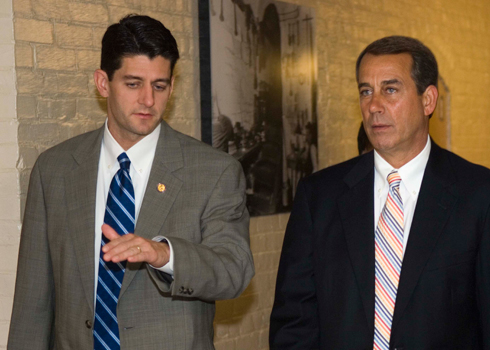This week, House Republicans will resurrect an arcane tool that will give its Budget Chairman temporary, but unilateral authority to set federal spending levels for part of this year.
Welcome back to the so-called “Demon Pass“, which is scheduled to make its return to the Capitol Hill on January 5.
Because Democrats didn’t pass a budget, and because spending authority expires in early March, there’s a strong chance that the government will run out of money before the House and Senate agree to new spending levels. When that happens, under the new House rules, spending will continue — but at levels no higher than those chosen by the House Budget Committee chairman, Paul Ryan.
As soon as those rules are adopted on Wednesday, Ryan’s spending levels will be considered — or “deemed” — adopted by the full House as if they’d passed a budget with a floor vote. The legislative language in the rules package holds that Ryan’s spending limits, “shall be considered as contained in a concurrent resolution on the budget for fiscal year 2011 and the submission thereof into the Congressional Record shall be considered as the completion of congressional action on a concurrent resolution on the budget for fiscal year 2011.”
Emphasis added. Back in March 2010, House Democrats were toying with using a similar process to pass health care reform. They were considering the Senate health care package, which they hated, and a package of amendments to that bill, which they liked. To square those views, they wanted to set up a procedural vote, which, if agreed to, would “deem” both bills passed at once. “Deem” and “pass.”
This quickly became known as “Demon Pass,” or the “Slaughter Solution,” named after House Rules Chair Louise Slaughter. Republicans rebelled, and conservatives went off the deep end. Radio talk show host Mark Levin called it “100 times worse than Watergate.”
Democrats eventually bowed to that pressure and decide not to use the process — known technically as “deeming,” or a “self-executing.”
In reality, deeming is used fairly frequently by both parties, but not typically on such high-profile issues. Democrats used it in lieu of passing a budget resolution last year — a move the GOP similarly opposed.
Like the House leadership, Ryan wants to cut discretionary spending dramatically, but his spokesman has not immediately returned a request for comment on whether he’ll use this authority to impose brief and drastic cuts without the Senate’s approval.
“Because CBO will be coming out with their baseline numbers at the end of the month, any numbers we would deem would be out of date in just a few weeks,” says Jo Maney, spokeswoman for incoming Rules Committee chairman David Dreier. ” So Mr. Ryan will put some numbers in place until the CBO numbers come out.”
Maney adds:
You are correct that Mr. Dreier and the GOP as a whole opposed the Dems’ deeming resolution. We were opposed because they did it in place of a budget resolution. In the instances when the GOP used deeming resolutions in the past, we deemed the House-passed budget levels. The Dems could not even do that, since they never even considered a budget resolution in committee.
“This proposed rule simply sets spending limits given the fact the Democrats failed to adopt a budget resolution last year,” says Brad Dayspring, spokesman for House Majority Leader-designate Eric Cantor. “The limits placed in the record by Mr Ryan expire as soon as we adopt a budget. This follows past precedent and there is no ‘self-executing’ rule.”
Late update: Ryan’s spokesman Conor Sweeney sends over this statement from Ryan. “[A]s outlined in the House Republicans’ Pledge to America, I plan to file a discretionary spending limit that would take non-security spending back to its pre-bailout, pre-stimulus spending levels.” The Senate will almost certainly take issue with this, so the stage is set for a showdown. More on this later.










